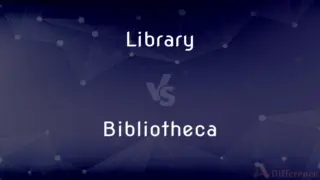Insight vs. Intuition — What's the Difference?
By Tayyaba Rehman & Fiza Rafique — Updated on April 4, 2024
Insight involves a clear understanding of a complex situation or problem, often after careful analysis, whereas intuition is a gut feeling or instinct without the need for conscious reasoning.

Difference Between Insight and Intuition
Table of Contents
ADVERTISEMENT
Key Differences
Insight typically results from deliberate thought, analysis, and the piecing together of information to form a coherent understanding of something. It is often associated with the "aha" moment when a solution to a problem becomes clear. On the other hand, intuition is more about an immediate understanding or knowledge of something without needing to process information in a step-by-step manner. It's a more instinctual or gut feeling that something is right or wrong.
While insight often relies on logical processes, such as pattern recognition or the application of known principles to new situations, intuition is more about an innate sense of knowing that can seem to bypass rational thought processes. Insights can sometimes be explained to others as the result of a logical sequence of thoughts, whereas intuitions are harder to rationalize and communicate effectively because they are more feeling-based.
Insight can be developed and enhanced through practice and experience in a specific field, leading to a deeper understanding and the ability to solve complex problems more efficiently. Intuition, however, is seen as a more natural ability or talent that one might hone but cannot acquire in the same way as insight through study or deliberate practice.
Insights often come to light after gathering and analyzing data, requiring time and effort to develop. Intuition, in contrast, can emerge spontaneously, without a clear trail of thought, and often in situations where quick decisions are necessary.
Although insights and intuitions can both lead to breakthroughs or important decisions, they are appreciated differently across various contexts. Insights are often valued in academic and professional settings where logical processes and evidence are paramount, while intuition is sometimes more valued in personal decision-making or creative endeavors where immediacy and emotional resonance are important.
ADVERTISEMENT
Comparison Chart
Basis
Deliberate thought and analysis
Instinctual feeling or gut reaction
Process
Logical, involves piecing together information
Immediate, bypasses step-by-step reasoning
Development
Can be enhanced through practice and experience
More innate, though can be honed
Communication
Can be explained through logic
Hard to rationalize and communicate
Time
Requires time and effort to develop
Emerges spontaneously
Compare with Definitions
Insight
A deep understanding of a person or thing.
The scientist had an insight into the problem that allowed for a breakthrough in the research.
Intuition
The ability to understand something immediately, without the need for conscious reasoning.
He made the decision based on intuition rather than facts.
Insight
An instance of apprehending the true nature of a thing, especially through intuitive understanding.
The detective's insight into the criminal's mind helped solve the case.
Intuition
An innate belief about something without logical evidence.
Despite the lack of evidence, his intuition was that the suspect was innocent.
Insight
An introspective look into one's own feelings or motivations.
His journal provided him with insight into his own fears and desires.
Intuition
A natural propensity or skill to envision or understand something without the need for direct evidence.
His intuition for predicting market trends is almost always accurate.
Insight
The capacity to gain an accurate and deep understanding of someone or something.
Her insight into human behavior is unparalleled.
Intuition
A thing that one knows or considers likely from instinctive feeling rather than conscious reasoning.
Her intuition told her that something was wrong.
Insight
The clear (and often sudden) understanding of a complex situation.
Her insight into the problem led to a novel solution that was quickly implemented.
Intuition
Immediate comprehension of a situation without the need for analysis.
With remarkable intuition, she could tell he was lying.
Insight
Insight is the understanding of a specific cause and effect within a particular context. The term insight can have several related meanings: a piece of information the act or result of understanding the inner nature of things or of seeing intuitively (called noesis in Greek) an introspection the power of acute observation and deduction, discernment, and perception, called intellection or noesis An understanding of cause and effect based on the identification of relationships and behaviors within a model, context, or scenario (see artificial intelligence)An insight that manifests itself suddenly, such as understanding how to solve a difficult problem, is sometimes called by the German word Aha-Erlebnis.
Intuition
Intuition is the ability to acquire knowledge without recourse to conscious reasoning. Different fields use the word "intuition" in very different ways, including but not limited to: direct access to unconscious knowledge; unconscious cognition; inner sensing; inner insight to unconscious pattern-recognition; and the ability to understand something instinctively, without any need for conscious reasoning.The word intuition comes from the Latin verb intueri translated as "consider" or from the late middle English word intuit, "to contemplate".
Insight
The capacity to gain an accurate and deep understanding of someone or something
His mind soared to previously unattainable heights of insight
Intuition
The ability to understand something instinctively, without the need for conscious reasoning
We shall allow our intuition to guide us
Insight
The ability to discern the true nature of a situation, especially by intuition.
Intuition
The faculty of knowing or understanding something without reasoning or proof.
Insight
A perception produced by this ability.
Intuition
An impression or insight gained by the use of this faculty
"I had this intuition you would come here just after the rain broke" (Carson McCullers).
Insight
A sight or view of the interior of anything; a deep inspection or view; introspection; frequently used with into.
Intuition
Immediate cognition without the use of conscious rational processes.
Insight
Power of acute observation and deduction
Intuition
A perceptive insight gained by the use of this faculty.
Insight
(marketing) Knowledge (usually derived from consumer understanding) that a company applies in order to make a product or brand perform better and be more appealing to customers
Intuition
A looking after; a regard to.
What, no reflection on a reward! He might have an intuition at it, as the encouragement, though not the cause, of his pains.
Insight
Intuitive apprehension of the inner nature of a thing or things; intuition.
Intuition
Direct apprehension or cognition; immediate knowledge, as in perception or consciousness; - distinguished from "mediate" knowledge, as in reasoning; as, the mind knows by intuition that black is not white, that a circle is not a square, that three are more than two, etc.; quick or ready insight or apprehension.
Sagacity and a nameless something more, - let us call it intuition.
Insight
(artificial intelligence) An extended understanding of a subject resulting from identification of relationships and behaviors within a model, context, or scenario.
Intuition
Any object or truth discerned by intuition.
Insight
(psychiatry) An individual's awareness of the nature and severity of one's mental illness.
Intuition
Any quick insight, recognized immediately without a reasoning process; a belief arrived at unconsciously; - often it is based on extensive experience of a subject.
Insight
A sight or view of the interior of anything; a deep inspection or view; introspection; - frequently used with into.
He had an insight into almost all the secrets of state.
Intuition
The ability to have insight into a matter without conscious thought; as, his chemical intuition allowed him to predict compound conformations without any conscious calculation; a mother's intuition often tells her what is best for her child.
Insight
Power of acute observation and deduction; penetration; discernment; perception.
Quickest insightIn all things that to greatest actions lead.
Intuition
Instinctive knowing (without the use of rational processes)
Insight
Clear or deep perception of a situation
Intuition
An impression that something might be the case;
He had an intuition that something had gone wrong
Insight
A feeling of understanding
Insight
The clear (and often sudden) understanding of a complex situation
Insight
Grasping the inner nature of things intuitively
Common Curiosities
Can intuition be as reliable as insight?
Intuition can be reliable in certain situations, especially when decisions need to be made quickly, but it might not always be as verifiable as insight.
What is intuition?
Intuition is knowing something instinctively without the need for conscious reasoning.
Is insight based on experience?
Yes, insight can be developed and enhanced through experience and practice in a specific field.
What is insight?
Insight is the understanding of specific cause and effect within a specific context.
Do professionals rely more on insight or intuition?
It depends on the field; some professions value logical analysis and insight, while others may also heavily rely on intuition.
Is intuition always instant?
Intuition typically manifests as an immediate feeling or sense, but it can also be a result of subconsciously processed information over time.
Is one more valuable than the other in decision-making?
The value depends on the context of the decision; some situations require the detailed analysis provided by insight, while others benefit from the quick judgment of intuition.
How do insight and intuition differ in their processes?
Insight involves deliberate thought and logical analysis, while intuition is an immediate understanding without conscious reasoning.
Can intuition be wrong?
Yes, like any form of decision-making, intuition can sometimes lead to incorrect conclusions or judgments.
How can one improve their insight?
By gaining more experience, practicing analytical thinking, and learning more about a specific subject.
How are insight and intuition communicated?
Insight can often be communicated through logical explanations, while intuition is more difficult to rationalize and share.
Are there any methods to specifically enhance intuition?
Enhancing intuition can involve mindfulness, being open to experiences, and learning to listen to and interpret one’s inner feelings and thoughts.
Can both insight and intuition lead to innovation?
Yes, both can lead to innovative ideas or solutions, though through different processes.
How does one know whether to trust their intuition?
Trusting intuition often comes from experience and the recognition of patterns, even if not consciously analyzed.
Can insight and intuition work together?
Yes, they often work together, with intuition guiding initial thoughts and insight providing the analysis and understanding.
Share Your Discovery

Previous Comparison
Library vs. Bibliotheca
Next Comparison
Recite vs. ChantAuthor Spotlight
Written by
Tayyaba RehmanTayyaba Rehman is a distinguished writer, currently serving as a primary contributor to askdifference.com. As a researcher in semantics and etymology, Tayyaba's passion for the complexity of languages and their distinctions has found a perfect home on the platform. Tayyaba delves into the intricacies of language, distinguishing between commonly confused words and phrases, thereby providing clarity for readers worldwide.
Co-written by
Fiza RafiqueFiza Rafique is a skilled content writer at AskDifference.com, where she meticulously refines and enhances written pieces. Drawing from her vast editorial expertise, Fiza ensures clarity, accuracy, and precision in every article. Passionate about language, she continually seeks to elevate the quality of content for readers worldwide.












































